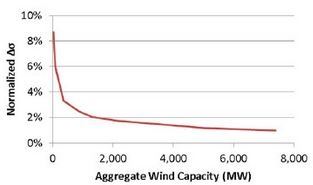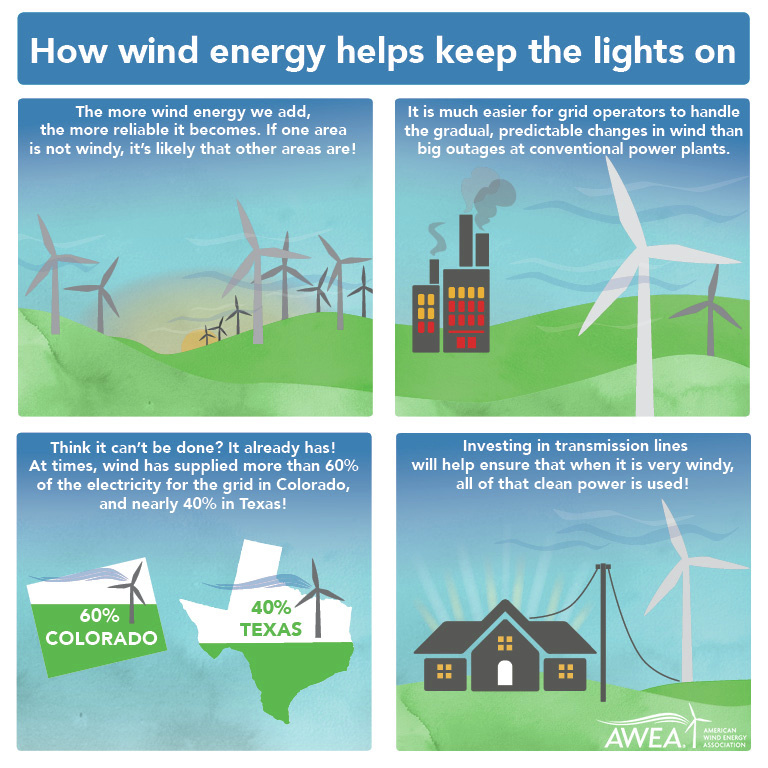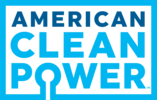News Release from American Clean Power Association (ACP)
Wind Industry Profile of
Inside US Wind - How wind energy helps keep the lights on despite variable winds
As the infographic below explains, wind energy can help reliably meet a large portion of the nation’s electricity needs today. That means that states can turn to wind energy to meet the Environmental Protection Agency’s Clean Power Plan to reduce carbon pollution.
Let’s break down each box of this graphic, based on my latest report, presentation, and fact sheet on the subject:
1. The more wind turbines we install, the less additional variability there is in the amount of power that they produce. As people know from their daily lives, the amount of wind blowing is constantly changing. However, even if one area with a wind farm is not very windy on a given day, another area may be, so their changes in output cancel each other out. The figure below based on data from a study by the National Renewable Energy Laboratory shows this phenomenon in action. Variability, represented on the y-axis (measured as the hourly change in output per megawatt of installed wind capacity), decreases as the amount of wind power (measured in megawatts of wind capacity) increases:

2. The changes in wind are gradual and increasingly predictable. Contrast that with the unpredictable, abrupt failures of conventional power plants, which can lead to a huge drop in the energy supply. The cost of accommodating the potential failures of these plants is far greater than accommodating the gradual, predictable changes of wind farms.
3. A lot more wind energy can be added today even without any technological advancements. U.S. wind energy already provides enough electricity to power the equivalent of over 18 million homes. Iowa and South Dakota reliably produced more than 25 percent of their electricity from wind last year, with a total of nine states above 12 percent and 17 states at more than 5 percent. At times, wind has supplied more than 60 percent of the electricity on the main grid in Colorado, and nearly 40 percent of the Texas grid.
4. Grid operators are already prepared to back up failures in conventional power plants, so they do not need additional backup to incorporate more wind power to the electricity supply. Large amounts of wind energy can be reliably added to the electricity supply without a need for energy storage, as grid operators already have a lot of flexible resources to accommodate changes in electricity demand and unexpected failures of large conventional power plants. Adding energy storage is typically much more expensive than adding more transmission or implementing grid operating reforms, such as regional coordination and faster generation dispatch times, that allow greater use of the flexibility we already have on the power system. These reforms will provide major net benefits to consumers and improve reliability regardless of whether more renewable energy is added. In the past, the lack of transmission meant that occasionally potential wind energy went to waste. By adding transmission, we can connect the country’s best wind resources with areas of high electricity demand, so more consumers can benefit from clean, affordable, homegrown wind power.

To receive more information on this article, our Newsletter or find out more about what w3.windfair.net has to offer, please, do not hesitate to contact Trevor Sievert at ts@windfair.net.
Please don't forget to follow us on Twitter: w3.windfair.net on Twitter
w3.windfair.net is the largest international B2B internet platform in wind energy – ultimately designed for connecting wind energy enthusiasts and companies across the globe.
- Source:
- American Wind Energy Association
- Author:
- Edited by Trevor Sievert, Online Editorial Journalist / by AWEA / By Michael Goggin
- Email:
- windmail@awea.org
- Link:
- www.aweablog.org/...

